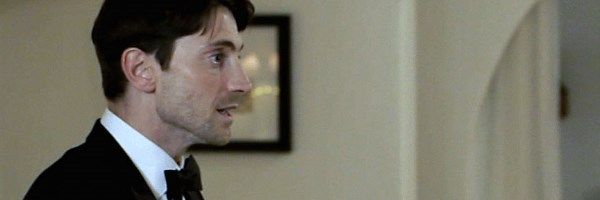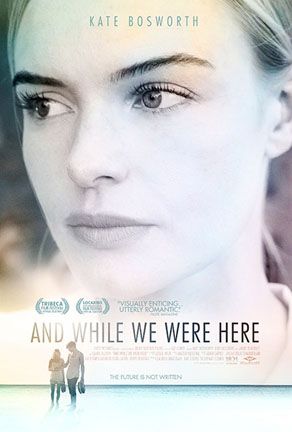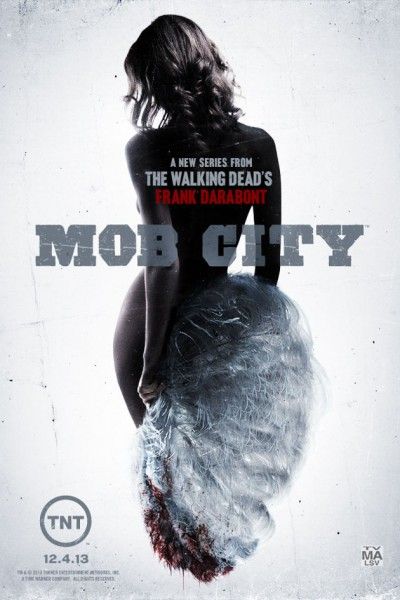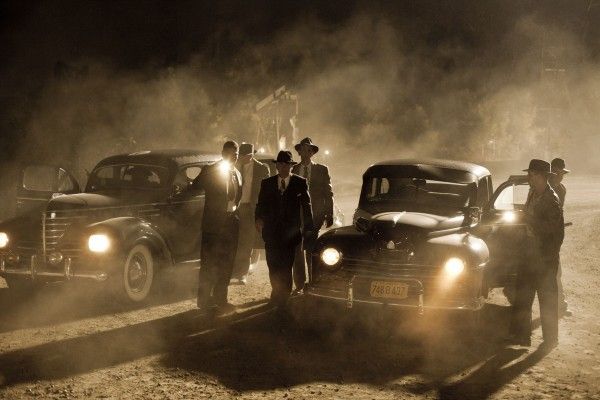From writer/director Kat Coiro, the indie drama And While We Were Here follows a young American writer named Jane (Kate Bosworth), who finds herself at a personal and professional crossroads when she accompanies her husband Leonard (Iddo Goldberg) to Italy on a business trip. Once there, their already strained marriage becomes glacial, and Jane finds her life complicated even further when she meets a younger man (Jamie Blackley).
During this recent exclusive phone interview with Collider, actor Iddo Goldberg talked about what drew him to this film and character, what it was like to work with Kate Bosworth, especially in some of the more intimate scenes, and the moments of shared silence. He also talked about the experience of working on Mob City, the TNT drama series from Frank Darabont, and how great it was to be a part of the BBC gangster saga Peaky Blinders, set in 1920s Birmingham. Check out what he had to say after the jump.
Collider: How did you come to this project?
IDDO GOLDBERG: I’d actually met Kate [Bosworth] a couple of times, through a mutual friend. Obviously Kate and Kat [Coiro] got along really well, doing Life Happens, and Kate wanted to make another film with Kat, straight away. I just got an email from her saying, “We’re making this film together. Come meet the director.” So, I met Kat and she told me about the story and how much input she was open to take and how open she was with the process. I think that would be music to any actor’s ears.
When you read the script and got a feel for the character, was there something about him that made you want to play the role?
GOLDBERG: Leonard and Jane were going to this amazing place, but they have this completely opposite experience. I liked being this guy who actually thought that this was going to be a great thing. I liked the fact that the rug was going to be pulled from under his feet. He’s normally one to sweep things under the rug, constantly, in life. I just liked that he had no idea what was coming.
Clearly these two people have a history from before the audience meets them, and they both seem to be living in very different realities.
GOLDBERG: Absolutely! It’s interesting to see how people go about keeping things in order and keeping things how they think things should be, to a point where they just can’t get out of it. Because of their history, how do you tell your loved one that the love that you had for each other has changed and that you want to move on and that this is what you wanted? I think they’ve both been very scared and very unbrave, in moving forward. It’s not really about Jane cheating. You don’t feel like she’s cheating on Leonard. It’s almost beyond that. Their relationship is no longer real. They’re trying to keep it what it was, years and years ago.
When you do a film like this, does it make you appreciate the relationships in your own life, that are honest and open?
GOLDBERG: Oh, my god, completely! We made this film the year before I got married, and it made me think about the relationship that I have with my wife now. It makes you see how lucky you are and how there’s just no substitute for the truth. Where would these two character be, if they were honest with each other? This story was just scratching the surface of their lives. I hope they’re both somewhere happy now, over the fact that they came to that crossroads, so they’ve gotten past it.
Did you do much research into what it would be like for someone who plays the viola professionally?
GOLDBERG: I don’t actually play a musical instrument. I had wanted to learn to play guitar when I was working on a film, but that stopped because I was not good at it. I didn’t have very long, so I met with this lady who plays in an orchestra in London. There is something really intense about it. All the research that I did and all the viola players that I watched, they’re just so immersed in it. What really struck me is that no one really looks like they’re having a great time when they’re playing the viola. They’re channeling a lot of the pain. Violins and violas sound very painful and very melancholy and hurt. None of the players ever jam. You don’t invite the viola player around for a jam session. But, it was a really good fit for Leonard.
There’s an almost uncomfortable intimacy in this film, with some of the scenes between you and Kate Bosworth. Was that challenging, as an actor?
GOLDBERG: It does help when you know someone. When I get on a job, I always strive to get some kind of familiarity with someone, so that you can flick the switch and not really worry about anything else. With these two characters, it always felt uncomfortable. It always felt like there was stuff that we weren’t being honest about. ‘Cause we were such a small unit making this film, I love photography and I always like making little short films as well, so (cinematographer) Doug Chamberlain was kind enough to let me pick up his camera once in awhile and shoot some stuff to get some more footage. That was really cool. I enjoyed it so much. It was always the stuff that Kate had with Jamie [Blackley], and they would always be having so much fun. I would always be like, “When we’re done with this scene, we’ve gotta go do our stuff, which is always a downer.” But even though it’s uncomfortable, what’s great about it is that you can get comfortable in those layers. I feel like our scenes had a lot of layers to them, and it’s always really nice for an actor to have that.
There are such interesting moments of shared silence, even with you both in the same room.
GOLDBERG: I have to agree. It’s really great that you picked up on that because I think that those moments are really there to reinforce and describe, in a nutshell, what their relationship had been like. They just don’t talk to each other. Jane says, “You don’t talk to me,” but you never really see Jane trying to talk to him. Silent moments can be so much more than the moments where people are just yabbering. When you think about your previous relationships, when someone doesn’t say something, you turn to them and say, “What’s up? I can hear you talking, inside your head.” It’s almost like Leonard just totally gave up on Jane, but could never tell her.
How has the experience of working on Mob City been? When you work on a project like that, do the wardrobe and the great sets really help you feel transported to a different time period?
GOLDBERG: Oh, my god, it was amazing! I actually had my birthday on set, which was cool. It was one of those days that they were doing little pick-ups, so there was a lot of waiting around. So, my wife and my manager surprised me and came to my dressing room with cupcakes. I was like, “I don’t know what you guys are going to see today. It’s going to be a bit boring. Let’s go get a coffee.” I completely forget that they were doing this scene where a major character was getting killed, and it all happens in this bedroom. The bedroom was just a square block in the center of this huge soundstage, and it had this warm light coming from it while the whole soundstage was black and dark, and we walked on and there was this character with loads of bullet holes, just bleeding. You get to see all these really cool things on this job. And then, Frank Darabont is at the fucking monitor and you’re like, “This is insanely cool!” I had a great time on that job.
Who are you playing on the show?
GOLDBERG: I play a character called Leslie Shermer, who is a crash driver for Bugsy Siegel’s crew. He’s someone who has a crazy glint in his eyes and rats crawling in his head. He’s completely rabid, and I think he’s been not quite the main guy throughout his whole life. Something happens during these six episodes that makes him take a huge risk. He basically sees an opportunity to blackmail someone, and he goes for it. He won’t stop for any reason, and he basically terrorizes Alexa Davalos’ character, throughout the whole season.
It’s definitely a show with a lot of attention and interest. What was your reaction to the script, when you first read it?
GOLDBERG: The book that it’s based on is fantastic and really insightful, and Frank Darabont’s writing is insane. You read so many scripts and, a lot of the time, they take awhile to read, but I flew through these quick. His writing is just fantastic. What’s great about it for everyone involved is that I really feel like they’ve only just scratched the surface. There’s so much more to show. There are so many stories. It’s such a great period. I’m not sure where it would go, straight after these six episodes, but I’m sure it’s going to be somewhere really exciting, dangerous and violent. It’s really, really violent. There are hardly any women in it. It’s a lot of angry, greedy, deceitful men.
Peaky Blinders is another project you’ve done that looks pretty amazing. How was that to work on?
GOLDBERG: I got to see some of that doing ADR, which is obviously very different from what it’s going to look like when it airs, but it’s epic. Otto Bathurst directed the first three episodes, and Tom Harper directed the last three, and they did such a great job. The world that they created, along with Steven Knight, who wrote it, was just so big and so grand. Usually, people cut corners and make things look bigger, but everything was just so grand and big and epic, on this production. It was great! It was just really, really brilliant. We weren’t doing it on a backlot. We were in the U.K., shooting in all these great locations up in Leeds. All the stuff just looked so authentic. It was really, really amazing. And then, you see the costumes. I’m sure you’ve heard this before from actors, but I’ve not had many experiences like it. Peaky Blinders is going to really be something. It was a real treat.
And While We Were Here opens in theaters on September 13th.




